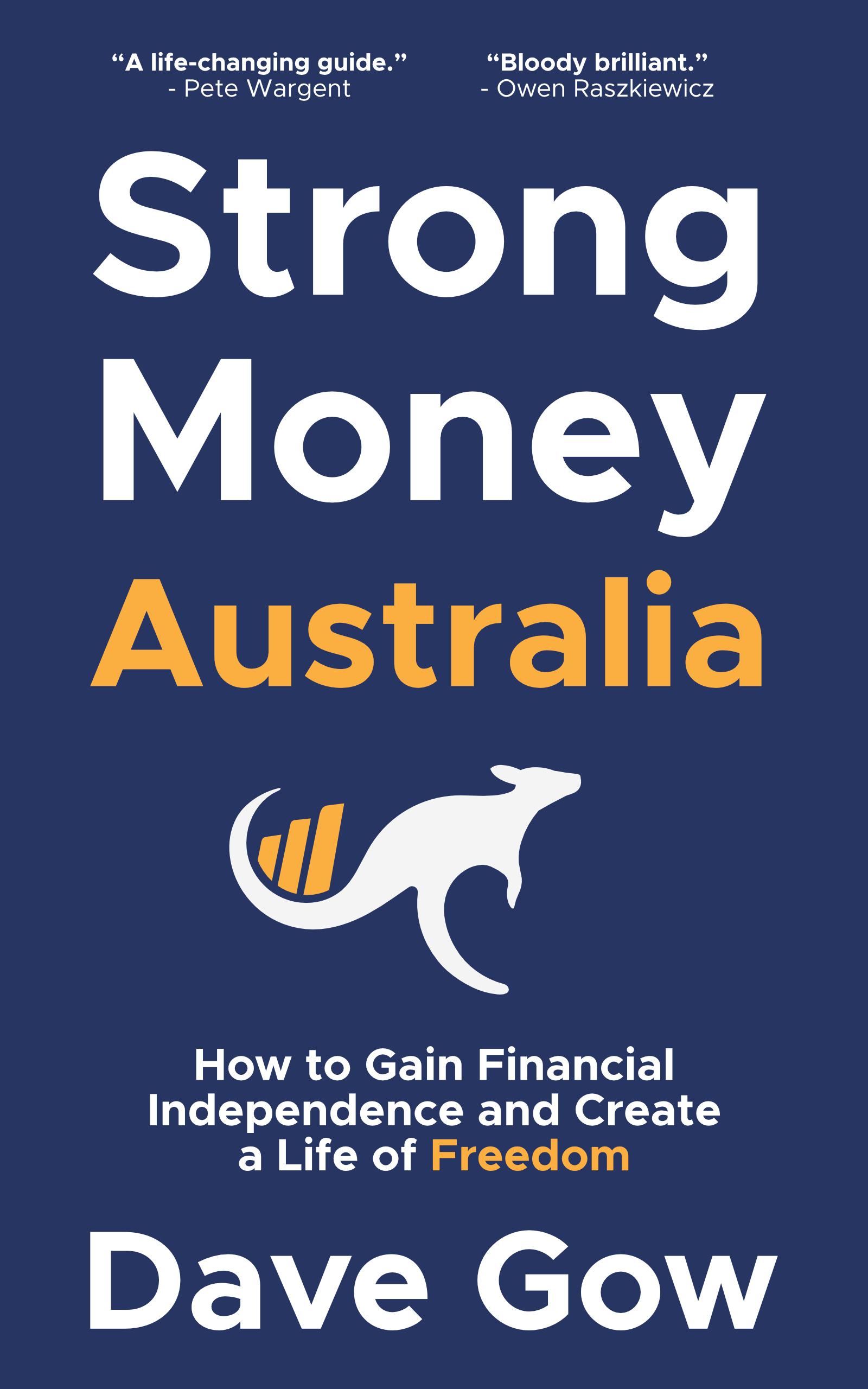
Each time I publish a portfolio update, there is often a small amount of confusion in the comments.
You might have noticed this too.
The question goes: “How are you able to be ‘retired’ if your passive income from investments is less than your spending?”
“Doesn’t this mean you’re forced to work, and therefore, are not financially independent at all?”
This thinking makes perfect sense. But it’s also easily explained (well, kind of!), even though it’s not intuitive at first.
Since the question comes up repeatedly, today I’ll share how our finances work on a month-to-month basis. Rather than point out other places I’ve mentioned it in passing, future commenters can be directed straight to this post.
Our situation and overall strategy
Regular readers will know we hit Financial Independence in 2017 with most of our savings in property, along with some shares.
The shares provide a convenient income stream, but because of mortgage debt, the properties do not. In fact, they actually cost us money because we’re now paying P&I on each loan.
The big picture plan is to convert our savings into a 100% share portfolio. This will give us a simple portfolio and a convenient passive income stream. To do this, we’re slowly selling off properties (every few years) and investing the proceeds into shares.
I wrote a lengthy post outlining this process of turning equity into income if you want more info on how that works. Oh, and we might buy a house later, but that’s another story!
Why we’re doing it this way
Some say we should just offload all the properties immediately. But we’re choosing the slow and steady transition rather than a ‘rip-the-band-aid-off’ approach for a few reasons.
— It’s a much lower stress way to transition. I wouldn’t like to be selling multiple assets at once, or even one after another and then having to invest large lumps of cash in one hit.
— The tax on our capital gains would have been much higher if we sold multiple properties in the same year. (this is no longer a problem as we’ve already sold the assets with the most gains)
— We wanted more flexibility over when to sell. Obviously, market conditions are rarely good in all markets at the same time. So, if the local property market is weak, we can try to wait a bit longer before selling the next one.
— We wanted to dollar cost average into shares over time. This has allowed us to keep investing regularly while learning at the same time. Plus, this helps avoid regret, because the effect of averaging out of one asset class and into another should smooth things out and reduce the chance of a really crappy outcome.
What this looks like in practice
After selling a property, we end up with a large lump of cash. We put this in an offset account. Any rental income, dividends and part-time work income we get rolls into this bank account too.
From here, it’s a big bucket we use each month to pay for everything. Living expenses, investment mortgages, as well as using a small amount to add to our share portfolio.
Mainly because of our P&I investment mortgages, this cash balance declines over time. I try to make sure each property sale creates enough cash to last 2-3 years. At that point, if we haven’t already, it’s time to sell another property and continue the process.
Over time, we end up with less property and more shares, eventually resulting in a 100% share portfolio which should create passive income higher than our spending.
So that’s how it works, even though it probably sounds strange to many people. In fact, I’ve not heard of anyone doing this before, but I’m sure someone has!
Look, I wish I had a clean and simple situation to share with you. But I just don’t. That’s the way it is. The other ‘transition’ scenarios I considered before leaving work were much less appealing than this one (most involved working longer, paying lots of CGT, or trying to take on more debt).
Concerns and possible problems
Now, I know some people will be thinking, “but you’re selling assets to live on, that can’t be sustainable.”
You can think of it like someone living off the proceeds from selling a portion of their share portfolio over time. This is perfectly sustainable, barring disaster. The difference is, we’re doing it with property, while reinvesting some cash into shares.
Unless property and shares both turn to shit for an extended period, this should work out okay. If our properties struggle (and in recent years they have), we simply end up with less cash from each sale, and less to put into shares.
That doesn’t sound great, does it? But let’s think it through. From our current situation, what does a bad outcome from here look like?
Let’s say we get zero dollars from the rest of our properties. We simply sell them off, the debt disappears, and we’re left with our current cash balance and shares.
We’d then invest our cash balance, so that would probably put our investment income at somewhere around $30,000. If our spending is $40,000, that’s not too bad. So, we’d end up being 75% retired. Hardly a terrible outcome.
And if you include the fact that we’re both happily earning some part-time income already, we’d actually still be able to invest each month and grow our portfolio from there. I definitely wouldn’t go back to full-time work just for the formality of being 100% FI as soon as possible.
At this point, I’m enjoying freedom so much that it simply wouldn’t be worth it. Especially considering what I’m doing doesn’t really feel like work and I would continue to do it regardless of how our investments turn out.
Honestly, if things get that bad, we’d likely choose to wait longer before selling properties, and maybe use our part-time income to keep paying the mortgages until things picked up.
We’re also flexible with our spending and have a growing amount of super which will eventually be accessible (much sooner for Mrs SMA than myself).
Here’s something I think people forget: If someone starts with 25 times their annual spending saved up (the typical recommendation), this cash will still last 25 years even if they don’t invest. Of course there’s inflation, but earning 1-2% in a savings account would cover that.
Sequence of returns
Consider someone living on an all-share portfolio who runs into a nasty patch of returns just after leaving work. The market collapses and dividends dry up.
What would they do? They’d simply pull one of their backup plan levers: use their cash or bonds, spend less, earn more, and so on. But they could also continue to spend down their assets if other backups will plug the gap later, like super or the pension.
There is no perfect and permanent plan. In the real world, shit happens and you have to be flexible. That’s just part of the deal when living off investments.
If you don’t like the sound of that, simply keep working. Either forever, or until you’ve amassed a ridiculously huge amount of investments. Either way, you’re trading away freedom now for security in the future.
Behind all the numbers here, I always try to stress the importance of being a resilient and adaptable person. Because that’s what makes all this work. And that’s what gives you confidence that whatever happens, you’ll adapt and continue to lead a happy life.
Final thoughts
Hopefully this article offers a good overview and clears up the confusion around how we manage our money each month. It’s unusual and not ideal, but it works for our situation.
It’s entirely possible that our plan doesn’t work out as well as… um, planned. But so what? By the time we’ve offloaded the last of our properties, we would’ve been doing our own thing and enjoying life for more than a decade!
And like I said, even a bad outcome from here results in eventually being slightly less than 100% FI, with zero change to our current life.
I guess we’ll deal with that particular tragedy if and when it happens 😉 But until then, freedom is the driving force in what we do, not fear.













Thanks SMA! Interesting post, and I’m sure it will answer many peoples questions.
Your point on needing to truly understand what living off investment income without ever selling any assets is a good one, I undertook a similar exercise in May 2018 to work out what ‘living off’ my FI portfolio could look like.
The results I came to then was that even with a far more equity based portfolio, I’d need to sell around 0.6% of the portfolio each year to hit the income target. Eliminating this need entirely implied a target of around $500 000 more in capital – no small task!
Cheers mate 🙂
That’s interesting, thanks for sharing. Definitely no easy feat! So did you increase your target or accept the selling method?
I think a lot of people (most people?) aren’t really all that thrilled with the idea of selling off assets in retirement. It’s not an intuitive concept. It’s probably the reason (at least in this country) for the strong bias towards Aussie shares, myself included.
But I’ve come to realise it’s not that big of a deal, as long as one has some workaround/backup plans to avoid depleting the portfolio at the worst times. But that’s not an easy ask, as most people would rather not have to be flexible. It’s probably one of the biggest challenges in the finance world.
Yes, I didn’t increase the target. I was quite surprised that the gap or selling necessary was only around 0.6% of the portfolio.
You’re right, there is a behavioural obstacle to identifying part of capital gains of a portfolio as ‘real’ income, and you can understand why – early farmers that ate their seed corn didn’t survive to pass on their genes!
It absolutely makes sense thinking about it that way! I’ve only come around to the idea relatively recently myself as you’d know, and it’s not an easy mental hurdle to get past.
Just wondering.
If you’re still intent on using dividends to support living expenses, but open to selling down capital gains (VGS). Would the strategy involve selling down a % of international holdings to make up any shortfall with the dividends?
So just as a poor example, say you earn 3.5% in dividends p.a and you sell down 0.5% from international holdings to maintain a 4% withdrawal rate.
Do I have this right? I have around 30% in international, the rest is domestic. Even with the reduction and tax inefficiency of the international dividend the overall dividend return of the entire portfolio is still around 4.5% including franking credits (I think, the recent cuts have skewed things), but there’s concentration risk of course. An increase in international would bring down this down further, so in that case you would just sell down a small % of international to cover the difference?
The focus would still be on dividend growth investing but being flexible to incorporate selling down also?
I agree it’s not an easy hurdle, the logic makes sense but there’s a psychological aspect that’s difficult to overcome.
Thanks.
Depends how you wanna look at it I guess. Some people like to exclude franking credits in these calculations, whereas some people bank on them. If franking refunds are stopped, then the first group of people’s plans are unaffected, so it makes sense to think about what the plan would be if that occurred.
Basically yes, you have it roughly right. In practice, someone is likely to be selling small pieces of their global shares for two reasons: to create extra income above the low dividend yield, and also to keep it in line with whatever target allocation they had planned.
Given most people will also end up earning some income after FI anyway, it probably ends up becoming a non-issue more often than not. Hope that helps.
I have taken the accumulate the assets path – now looking at 3 paid off properties and large super balance.. it means retirement is not going to be a problem – but i actually enjoy the job – workng from home – soon – in the next 12 months will buy the motor home – 3 rents will pay for everything super will be just accumulating – probably leave it to the kids – the investments tho are diversified 50% at risk 50% in property and bonds. seems to work out best over time if you can manage seeing the at risk portfolio bounce around a bit. i still do not feel safe.. so working on that now.. often it is the things you cannot control that do you.. for me it is climate change and for that we need radical change in public thinking and real investment.
Sounds like you’ve done a fantastic job Ben, well done mate!
Yeah I know what you mean. There’s always going to be a decent level of uncertainty, in life and in our investments. There’s no way to remove that. So we just need to accept it and to the best we can from where we are now, focusing on the things we can control. Other than that, I dunno…
I have seen an approach like this on the Aussie Firebug site and his fire calculator. What this calculator assumes is that you have more than one fire date.
In his calculator you simply have 2 Fire amounts and dates. One which is your Non Super Amount and the other is your Super Amount. Using the calculator you can generate 2 amounts and dates. You hit your pre super amount first and can spend this till you hit 65. Then you then use your super after this.
What you have said makes sense, You hit one fire date with your property back in 2017. This amount will say cover you for the next say 25 years. Then you will have a 2nd fire date after this in future which will be made up of other investments and super which will cover the rest of your life.
Hey Nat. Yeah that’s pretty much the case I think. Only difference is that this is with property rather than a simple share portfolio, so it’s perhaps a bit messier that’s all 🙂
Excellent article. Thanks David.
Just to clarify: is your share portfolio 100% Aussie shares + your IP. Doesn’t that mean you have a big home bias?
Thanks Aly. Our net worth is about 20% global shares, but the rest is Aussie shares and property. So yes a strong home bias, but we’re steadily increasing our global shares over time. You can find more on our portfolio here and my diversification plans going forward here.
Less than ideal situation with the properties, but if it works, gladly take it. I’m glad you didn’t fall into the trap of pursuing this ideal of what FI looks like, and instead you adapted it to make it work for you. There’s nothing wrong with 75% FI, and I definitely wouldn’t go back to full time work either, screw that. Thanks for the great read!
“screw that”… Haha summed up how I feel perfectly 😉
Appreciate the support! If people want a nice simple example of an FI journey and retirement, they’ll have to look elsewhere lol.
Hi Dave ,
Mate, sounds good to me !! …Mrs MSM and yourself are emotionally intelligent people and in sinc , so enjoy the freedom !! …well deserved!! ????????????
Cheers
Your point on trading freedom for security is well made.
If the rat race is not for you, the amount of money you need to pursue a better life fit is not as great as some people make it out to be. Everything doesn’t have to be locked into place with 100% certainty before you put time before money.
When the road forks, take the route towards freedom over fear. There will be many future forks, keep adapting, keep veering towards freedom.
I have this unusual (I know, weird) interest in sequence risk and safe withdrawal that I like to use some of my freed-up time on. The math can’t ultimately be squared on the topic because the future isn’t knowable, so what it really comes down to is that Freedom is more mindset than a particular financial balance.
There is some woeful information out there for the uninformed. I recently stumbled across a blog called “the proper safe withdrawal rate” from somebody calling themselves the financial samurai. I don’t know if he has a following in FIRE community, but he boasts a million ‘financial savvy’ readers. Any rate he claims the current “proper” SWR is 0.5% which equates to 200X expenses. (It doesn’t stand even the most basic tests of plausibility, but there is a lot of blind leading the blind going on)
I sort of pre-date the fire “movement” but relate strongly to freedom or ability to say FU and do what I want rather than what somebody else wants and wanted to make a comment to support your concept of FIRE being primarily about mindset and flexibility. Retirement is not the proof of financial independence.
Gosh, the financial samurai article is such total BS. The series about safe withdrawal rate on ordinarydollar is so much better and more realistic, and based on actual data. The financial samurai one IMO is not a SWR, its an estimation of the size of a portfolio you need to be completely sure you never need to sell assets no matter how down a year it is. It’s utterly ridiculous.
Thanks very much for your support and your thoughts here. You’ve added some great thoughts to this and other conversations. There is probably an unnecessary amount of fear around this topic, and as you say mindset is the key to freedom, rather than a certain set of finances.
Some people have a hard time accepting that the future is unknowable and no plan is bulletproof – they crave certainty and some type of guaranteed plan, which is kind of understandable. Seeking more security is fine to a point, but the trade-off of time/freedom is rarely given the weight it deserves.
I’m aware of financial samurai but haven’t seen read that particular article (nor will I bother reading it). Common sense should tell someone that 200x expenses is just ridiculous – perhaps a combination of fear mongering, attention seeking and bad advice.
Cheers Dunno!
Everyone’s FIRE journey is unique, I too am going to do things my own way. I didn’t even think about FIRE until my early 30s after paying off the mortgage on my PPOR at the same time I had been pumping extra in my superannuation in the 10 years leading up to this. When I discovered FIRE I had a big WTF I’ve done everything wrong! Moment.
But after trying to work out what to do I discovered that if I can buildup a decent portfolio over a small amount of time I’ll be able to retire mid 40s and sell down that portfolio until I reach my superannuation preservation age. Now approaching my late 30s I don’t need to add a single $ to my super it will be a massive snowball and more than I need.
Thanks for sharing your story. Definitely no right way to do it – your plan sounds perfectly good to me 🙂
Being retired in your mid 40s is nothing short of incredible in anyone’s book!
I was interested reading the Aussie Firebug’s dual FI positions too. I’m trying to work out my FI target but I have UK super that is receivable at 55, a Kiwisaver that is receivable at 65 and I understand that I can take my Australian super (which I’m salary sacrificing into) at 60 if I make a statutory declaration not to work. Anyone know the details of that? Can you do a bit of part time work or is it a definitive “not at all” and does that mean I could at 65 or is it still out of the equation. I can’t see myself wanting to do nothing at all on retirement. Do I have 3 FI dates? I’m currently 49 and only just started working on a fund outside my super (late I know…). I’d love to retire early….
Cheers
Kiwi Expat
With Aussie super, you can generally start a ‘transition to retirement’ if still working part time and access 4-10% of it each year, or you can ‘declare’ retirement and get all of it.
So depending on how much you expect to have at 55, 60 and 65, you may be able to work for the next few years, save and invest outside super, then semi-retire and work part time while living off some of your portfolio. Then use your other retirement funds as they become available while you continue working part time?
Obviously I have zero clue of the details so this is just a general thought and something I’d spend some time considering the best balance of work/freedom/lifestyle that feels right for you. Hope that helps!
Thanks for your help Dave – that actually makes things a lot clearer! Time to crunch some numbers…
If it works for you guys Dave that’s all that matters. Your life, financial arrangements or otherwise, doesn’t have to fit anyone else’s ideal. As you point out life rarely goes exactly as planned anyway. We all have adapt the strategy and work with what we got. Hell I only just got into shares, I thought bank shares would be as safe as “money in the bank” and straight away the market crashed from covid 19 and banks were adversely affected worse than anything else but travel. Do you think I’m discouraged. Hell no, but I’m buying shares in supermarkets now. Great blog Dave keep up the good work.
Cheers James, appreciate your support 🙂
The current situation (all of it, not just investing) is hopefully a wake-up call for many of us, to realise that we honestly have no clue of future events and to be prepared to adapt to whatever situation we find ourselves in.
It’s definitely a strong case for building a good financial position, having healthy habits, and having diversified investments.
Hi Dave,
Enjoyed the article and clarity. The only bit I did not like was the paragraph where you mentioned the pension as a back up plan should the all share portfolio goes to zero dividend in hard times. As someone who has spent a lot of time planning FI, if suddenly I needed the pension post FI, I would feel a deep sense of failure. If I had ever thought that pension was a feasible option, then there would never have been a need to pursue FI. This sounds inflexible but just my 2c.
Hey Jon. Thanks, and I can see your point. But I guess the key difference is the pension is kind of irrelevant in terms of ‘retiring early’ which is what this is all about. But I still believe it shouldn’t be disregarded as a backup plan for later on, and this alleviates the common fear of running out of money in a worst case scenario. Almost everyone who reaches FI will not need the pension, but it’s still there as a safety net.
FI is about being able to chart your own course in life at any age, and that’s its true value versus waiting for traditional retirement.